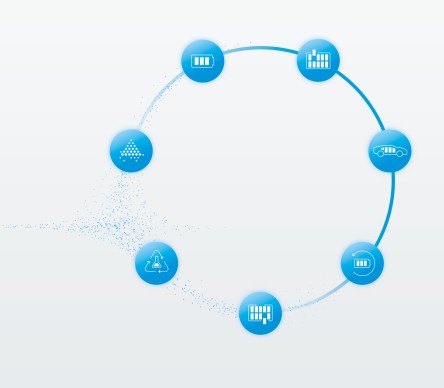The number of vehicles with electric drives is continuously increasing, and is making a significant contribution to the decarbonization of road traffic. However, at the end of the battery's life cycle, there is the question of recycling the materials it contains. Automation not only enables the economical production of battery cells, but also the precise monitoring and control of recycling processes. By using automated systems, valuable materials can be efficiently recovered from the batteries and reused. This guarantees a more sustainable and environmentally friendly value chain.

Overview of the battery life cycle
Start the life cycle: clockwise from the left.
- Preparation of raw materials
- Cell production
- Module and pack assembly
- Integration in the vehicle
- Remanufacturing/second life
- Dissasembly
- Recycling and separation of the raw materials
Festo product portfolio for battery production
Battery production is an extremely sensitive process. Every step, whether processing, transporting or quality inspection, requires a clean production environment.
Find out how to produce safe batteries with non-ferrous metal-free automation components in our 'Products for battery production' catalog.
Safe battery cells with the right components
Choosing the right automation components is crucial for efficient battery cell production. If these contain copper, nickel, and zinc, they can lead to contamination in the battery cell and damage it through electrochemical processes. With the non-ferrous metal-free F1A product portfolio from Festo, you are on the safe side. Find out more about clean batteries in our eBook.